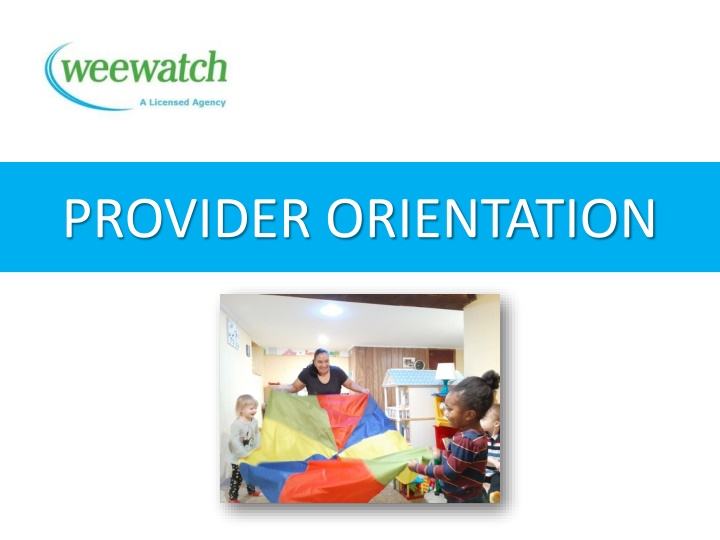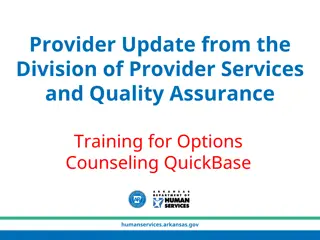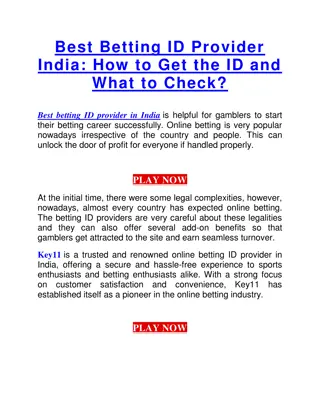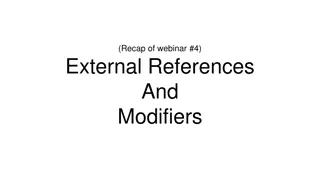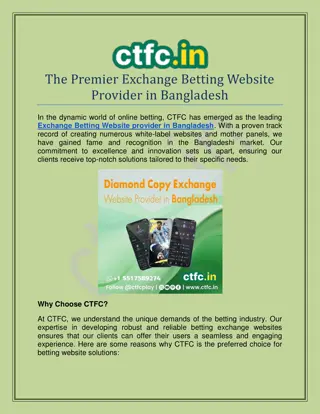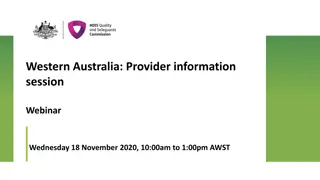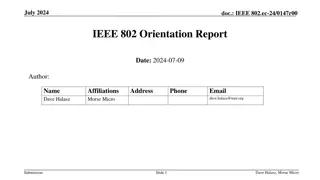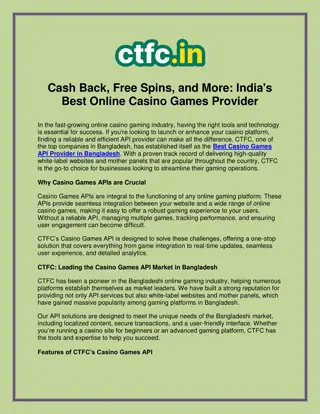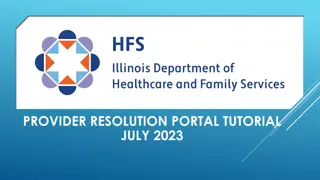Provider Orientation
Welcome to the Wee Watch Provider Orientation session where you will learn about introductions, your role as a provider, rules and regulations, child abuse guidelines, programming, home setup, nutrition, and ongoing support. Discover the history and impact of Wee Watch, key program statements, and the importance of following regulations to ensure a safe and nurturing environment for children in your care.
Download Presentation

Please find below an Image/Link to download the presentation.
The content on the website is provided AS IS for your information and personal use only. It may not be sold, licensed, or shared on other websites without obtaining consent from the author.If you encounter any issues during the download, it is possible that the publisher has removed the file from their server.
You are allowed to download the files provided on this website for personal or commercial use, subject to the condition that they are used lawfully. All files are the property of their respective owners.
The content on the website is provided AS IS for your information and personal use only. It may not be sold, licensed, or shared on other websites without obtaining consent from the author.
E N D
Presentation Transcript
Provider Orientation PROVIDER ORIENTATION
Welcome! Wee are Happy to have you on the team!!
What we are going to cover today Introductions and Ice Breaker Who Wee Are Your Role as a Provider Rules and Regulations Child Abuse and Guidance The fun stuff Programming Setting up your Home Health Regulations Nutrition Serious Occurrences Home Visits Ongoing Support for Providers
Ice Breaker Remove or replace this slide!! See appendix section at the back choose one of the ice breakers provided and move the slide here Or make up you own ice breaker the purpose is to get people in the workshop talking and comfortable
Who Wee Are Wee Watch was started in 1984 by a mother who saw a need in communities for quality licensed home care You are part of the biggest network of childcare Providers in the country! Wee Watch has: 1200+ childcare Providers, and 6800 children in care in Ontario 44 Childcare agencies and 70 Home Visitors! We are known for the high quality of care we provide in all our homes!
Wee Watch Facts and Figures 85+ Communities we serve in 40 Years in Business 60,000+ Children in our care since inception 11,000+ Annual Home Visits Children enrolled 6800+ 1300 Providers
Wee Watch Program Statement Well Being Engagement Expression Belonging
Your Role as a Wee Watch Provider
Rules and Regulations It is important that you read, understand and follow all Rules and Regulations you and the children in care Regulations are there to protect Many of the regulations are to ensure compliance with the Ministry guidelines Some are Wee Watch only requirements because we want to meet and exceed requirements
Child Abuse Wee Watch is committed to taking a pro-active position regarding the prevention of child abuse If you suspect a child has been or is being abused: 1. Call CAS immediately (person who suspects must make the call) Call your Wee Watch Supervisor Seek immediate medical attention if child has injuries Document record details on Report of Suspected Child Abuse 2. 3. 4.
Child Guidance Prohibited Practices 1. Corporal Punishment 2. Physical restraint of the child 3. Locking exits 4. Use of harsh or degrading measures or threats or derogatory language 5. Depriving child of basic needs including food, drink, shelter, sleep, toilet use, clothing or bedding 6. Inflicting any bodily harm , including making children eat or drink against their will
What is Wee Learn? Fosters learning through play Develops the whole child Takes into consideration ages and stages of each child Offers activities that can be tailored so that all age groups can participate Has a wide range of activities to spark children s interests
Learning through Play Play is fun for children Play is the way children learn about themselves, their environment, people and the world around them Through play they learn to solve problems and get along with others It enhances creativity and develops leadership skills and healthy personalities Children develop skills that are needed to learn to read and write
The Benefits of the Program Child and Family Benefits Provider Benefits Child can develop at their own pace Material is designed based on stages of child development Continuous education and skill development through each child receiving monthly Play and Learn workbooks or kit Provides you many resources and ideas for programming Parents are engaged in their child s development through My Day/My Week formscompleted by Providers On going support through home visits Outlines different stages and developmental milestones Keeps children engaged and busy
The Wee Learn Tools Wee Stages of Development Play & Learn Workbooks FUNdamental Themes FUNdamental Worksheets Activity Handbook
FUNdamental Themes An important component of this program is to ensure that a wide variety of activities and concepts are inducted to the children this is done through age-appropriate themes. Providers can access themes online FUNdamental Theme Examples: Let s Pretend Me and My Family The Great Outdoors What a Wonderful World And more .
FUNdamental Worksheets Worksheets complement the themes that a Provider has chosen for the children Enables practical application to further children s developmental skills in areas such as math, language, and fine motor
Activity Handbook A valuable resource for you as Providers to plan and carry out activities for the children of all ages and skill levels Activities require little or no equipment
Play and Learn Kits and Workbooks Designed and Developed by a team of childcare experts for Wee Watch! Workbooks and the Wee Beginner Kits are designed to develop skills in literacy, numeracy, fine motor, and science and social studies Parents love that they can see what their child has done in daycare
Play and Learn STAGE Wee Beginner AGE 12-24 months What they receive A portfolio bag (if agencies order) 1 book every 3 months Wee Explorer 2-3 years Wee Builder 3-4 years 1 book every 3 months Wee Learner 4-5 years 1 book every 3 months Wee Expert 5-6 years 1 book every 3 months Wee Mentor 6+ years 4 activity books available, the child can decide when to complete or use
Wee Beginner Kit Each Provider that have children between the ages 12-24 months will receive a kit Each kit consists of a laminated Task Card with activities that support various areas of development (i.e. fine/gross motor),foam letters, stacking cups, tripod crayons, and white board with marker Kit will remain at the Provider s home
Together Wee Can Annual program that brings all our homes across Ontario together to participate in activities
Setting up your home A. PHYSICAL 1. Safety (review all information on Quarterly Site Safety) Do not drink hot beverages around children Watch for foods that can choke a child Never leave a child alone in a jolly jumper or high or high chair Baby walkers are NOT allowed 2. Emergencies (we ll discuss Serious Occurrence procedure) Keep exits clear! Have an emergency evacuation plan Fire extinguisher in the kitchen Do fire drills monthly 3. Health (we ll discuss in Health regulation section) Soap at all sinks Have specific areas for changing diapers 4. Pets (we ll discuss in Health regulation section) Limited contact with children in care
Setting up your home B. Facilities, Equipment and Supplies 1. Eating Have properly equipped eating area, bibs and paper towels or wash cloths Weekly menu available for parents to see Post allergy notices 2. Sleeping Cots, mats or beds with safety bars Cribs, playpens meet standards Separate bed and sheets for each child 3. Outings Sunblock with permission Outing supply bag: medical consent cards, extra house key, first aid supplies, tissues/wipes, diapering supplies 4. Arriving and Leaving Post notices Makes displays Designate an area for coats, boots
Setting up your home C. ACTIVITY AREAS AND SUPPLIES 2. Music Have a music corner You can have real and home made instruments 1. Reading and Language Designate an area for reading Make books available for all ages and not mixed with toys Leverage the public library 3. Imagination Play and Drama Doll houses and toy fridge or stove Old clothes, hats, purses, for dress up Click on picture to start video
Setting up your home C. ACTIVITY AREAS AND SUPPLIES Cont d 4. Creative and Sensory Activities Designate an area where kids can be messy Have some items on hand: Paint and brushes Variety of paper types and colours Children s scissors and glue, crayons 5. Eye-Hand Coordination Picture puzzles Peg board and pegs Small blocks and nesting toys markers 7. Gross Motor Balls of various sizes Hoops Large cardboard boxes 6. Cognitive Development Matching games Learning games for numbers, shapes etc Science activities Lets think of additional ideas together
Health Regulations Read all regulations carefully let s review Environment (this includes marijuana ) Medical Immunization Records Contagious Illnesses Administration of Medication Sanitary Practices Pets Diarrhea Management Allergies and Anaphylaxis Individual Medical Plan Smoke and Vaping Free
Nutrition Topics we will review: Food Safety Canada s Food Guide Menu Planning
Nutrition Come up with 4 examples for each food group What should be the drink of choice? Grains Vegetables Protein
Monthly Home Visits Why do Home Visitors come to your home monthly? To support you!
Monthly Home Visits The Home Visitor s role is to : Provide support and resources to Providers To ensure that all Ministry and Wee Watch requirements are being implemented properly in the home Observe the children in their care setting Home Visitors will observe and look for: Programming (age/stage appropriate) Nutritional foods being served Ratios Health and Safety items Interactions with children
Quarterly Home Visits Home Visitors will complete: Wee Watch Site Safety Ministry Checklist Review Serious Occurrence Procedures Review Fire Evacuation Plan
Home Visitor Reports Monthly: Provider Home Visit Report Child Home Visit Report As required: Provider Follow Up Form Notice of Deficiency
Occurrences Lets review Serious Occurrences Major Occurrences Minor Occurrences
Occurrences review What type of Occurrence is it? What should you do? Scenario 1: a 2 year old boy stumbles and bumps his head on a bookcase, there is a visible goose egg bump on his head immediately and he is crying.
Occurrences review What type of Occurrence is it? What should you do? Scenario 2: a 3 year old girl arrived in care in the morning with no indication of illness, as the day progresses you notice she doesn't want to eat and is lethargic, when you take her temperature it is 39 degrees
On-going Support for Providers We are committed to supporting you and all our Providers with Wee Learn programming tools: Provider Manual Website Provider s log in Wee Watch Newsletters Home Visitor for additional support
Ongoing Training for Providers Why? We expect everyone to provide a high level of service, and to continue to learn and improve Builds your confidence and experience as a professional care provider Ministry requirement to have 10 hours of professional development per year Providers ask us for it!
Final Words Providers are very important to our agency, to parents and most importantly to the children! Welcome to Wee Watch - We are glad you are here!
Appendix Use these slide throughout as you see fit Move them to the right place in the presentation by dragging them or cutting and pasting
Creativity Ice Breaker Instructions: On a piece of paper write as many uses for a Paper clip that you can think of in 1 min .there are NO wrong answers
Sweet Greet Ice Breaker If you could visit any place in the world where would you go and why? One thing you are most proud of One thing you are worried about being a Provider
